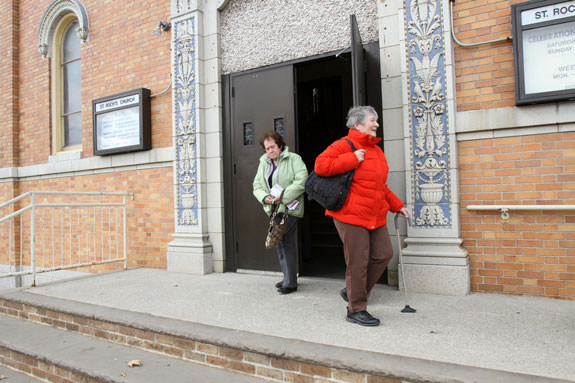by Beth Griffin

(CNS) – In a long-awaited but nonetheless stunning announcement, the Archdiocese of New York said Nov. 2 it would merge 112 of its 368 parishes into 55, effectively shuttering at least 31 churches by Aug. 1, 2015.
Twenty-four of the merged parishes will continue to celebrate scheduled Masses and sacraments at two sites.
Cardinal Timothy M. Dolan of New York said the painful reorganization is a necessary adjustment to historic parish infrastructure that will strengthen the Catholic Church in the archdiocese. “The parish is the people and the people have to be cared for. What’s most important is the faith continues, the Eucharist continues and the sacraments continue,” he said.
The cardinal said All Souls’ Day was a fitting time to break the news because the feast and the decisions are not about dying but rising.
“It’s about what Pope Benedict said, ‘The vine has to be pruned once in a while if it’s going to grow,’” the cardinal said, “and it’s about what Pope St. John Paul II said, ‘We’re into mission and not maintenance’ and it’s about what Pope Francis said, ‘The church is not about building structures. It’s about welcome, love, mercy, service, embracing and inviting. It’s about going ahead and not getting bogged down in the past.”
The cardinal said the math shows an awkward, lopsided distribution of parishes that is inconsistent with the Catholic population, especially in Manhattan. He said 25 percent of the parishes of the archdiocese are located in that borough, yet only 12 percent of the Catholic population is there. In Manhattan, 28 parishes will merge to form 13, and nine sites will no longer hold weekly Mass, although they may be used on special occasions.
Cardinal Dolan said the process was not an easy one, and the announcement caused understandable anger and hurt. “We know there’s going to be a lot of tears, a lot of shouts, a lot of cussing and we need to be patient with people and listen to them, but there’s a lot of trust and growth and strength that come out of this.”
The mergers are the culmination of a five-year pastoral planning process known as Making All Things New, which sought input from 368 parishes clustered into 75 groups, as well as a 40-person advisory committee, the archdiocesan priests’ council and archdiocesan staff.
Cardinal Dolan said the restructuring is not the result of a shortage of priests but from a shortage of the faithful. “They’re not coming anymore and we have to get them back.”
He said a Catholics Come Home program planned several years ago was canceled because some pastors “are so oppressed by bills and maintenance that we can’t do mission. We’ve got to be talking about how to fill the buildings and not how to keep them up, insure them and tuck-point them.”
“We have to turn from being shepherds to being fishermen and [the mergers] will free us up to do that. We will have better utilization of priests, trained lay ministers, religious women and men who are involved in leadership who aren’t going to have to spend all their time propping up places and are going to be better used at, granted, fewer, but much more vigorous and solid parishes,” he explained.
Cardinal Dolan said people at the parishes that will receive new parishioners are “probably breathing a sigh of relief,” because they’re “still at home.” But in the 31 parishes that will no longer have regular Masses, he said, “that’s where the sting is and that’s where the tears are because those 31 sites will be more or less shuttered after Aug. 1. On rare, extraordinary occasions … those parishes could every once in a while, have a Mass. But in general, literally, the people have to move.”
The changes will be implemented gradually but will be completed by Aug. 1, 2015. The cardinal likened the merger process to a family whose grown children convince their parents to sell a home that is too large for them. “You don’t say, ‘You don’t need this house anymore and it’s costing a bundle to keep it going’ and then have the movers pull up. You want to give people time.”
Auxiliary Bishop John J. O’Hara, director of the Making All Things New process, said the archdiocese would provide guidance, direction and support to pastors to help them shepherd their people in the mergers. He said the transition to the new parishes will likely be marked by prayer services, liturgical expressions and the procession of items from the old church to the shared site.
Cardinal Dolan said the process is not new. “If you read the Acts of the Apostles, you see the church has been in pastoral planning mode since day one, on Pentecost Sunday.”
While he did not anticipate another wave of mergers, he said there are parishes whose input is still being considered.

